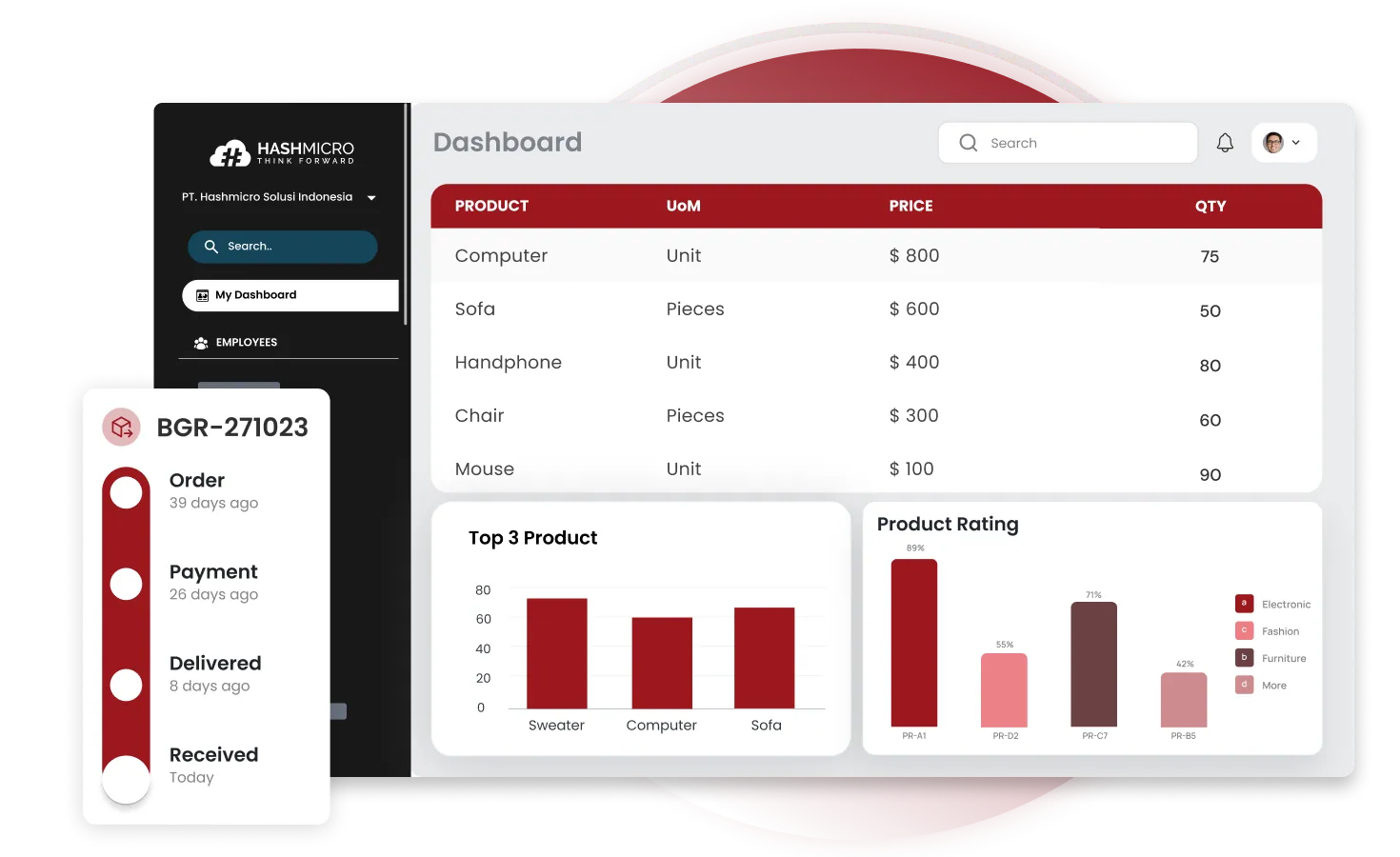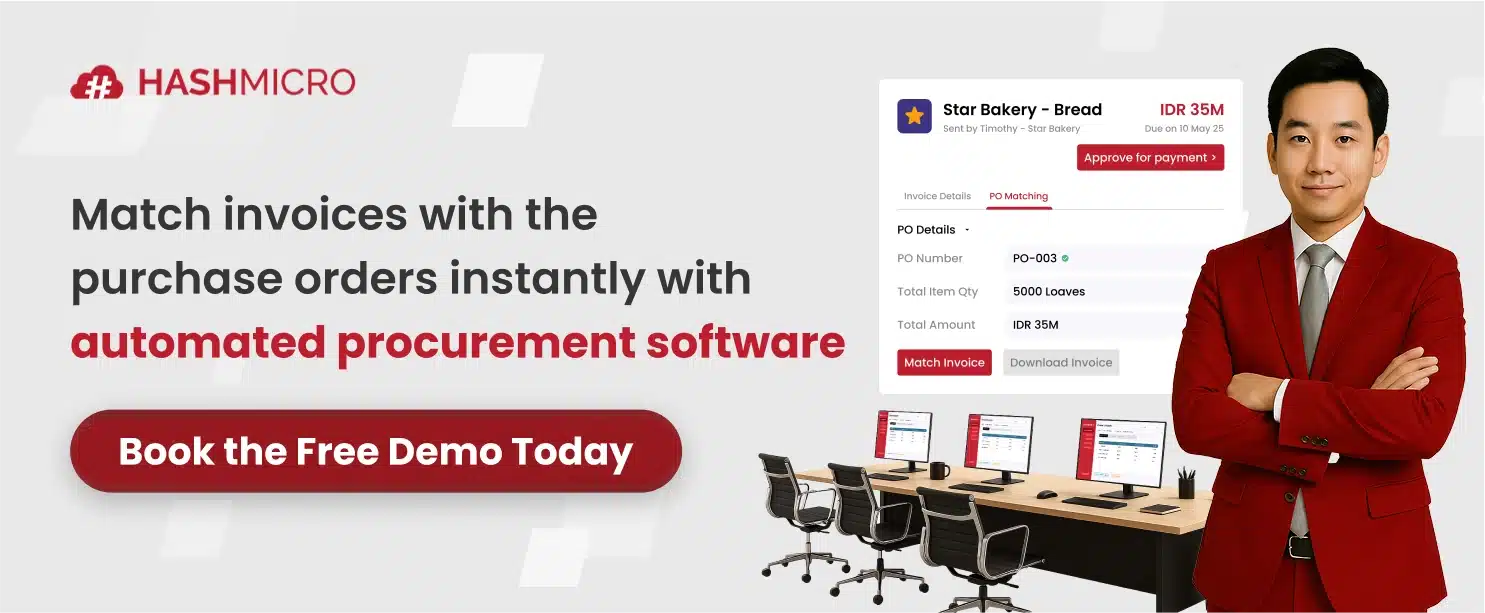Supplier onboarding has shifted from a simple formality to a key driver of efficiency and compliance. Yet many businesses still struggle with fragmented systems, manual data entry, and delays that slow down collaboration.
Reports show that over half of businesses still rely on spreadsheets and email, driving costs up to USD 35,000 per supplier, while automation cuts it to under USD 2,400. Worse, 80% of risks are only found after onboarding, creating costly setbacks.
This is where HashMicro Procurement stands out. By automating workflows, centralizing documents, and simplifying compliance, the platform reduces costs, accelerates integration, and builds stronger supplier relationships.
In this guide, we’ll break down each step of the modern onboarding journey from self-registration and verification to ERP integration, risk management, and performance tracking.
Key Takeaways
|
What is Supplier Onboarding
Supplier onboarding is the process of registering and integrating new vendors into a company’s procurement system. It involves verifying documents, ensuring compliance, and establishing seamless workflows for long-term collaboration.
An effective onboarding process typically includes gathering supplier data, validating certifications, conducting risk checks, and integrating the supplier management, such as ERP or procurement software.
When managed properly, supplier onboarding helps companies secure compliance, avoid hidden risks, and create a transparent working relationship with vendors. It also shortens procurement cycles, cuts operational costs, and ensures both parties can collaborate more effectively in the long run.
Steps of the Supplier Onboarding Process
A well-structured supplier onboarding process ensures that vendors are not only registered but also aligned with company standards and long-term business goals. Below are supplier onboarding processes that guide companies toward a more reliable onboarding journey.
1. Supplier registration
The first step involves gathering essential supplier data, including company profile, contact details, bank information, and supporting documents. Having a standardized registration process helps organizations avoid missing information and keeps records consistent.
2. Verification and compliance
After registration, companies must validate the information provided. This includes checking licenses, certifications, tax documents, and regulatory compliance. Proper verification ensures that suppliers meet legal standards and align with internal procurement policies.
3. Risk assessment
Once compliance is confirmed, businesses need to assess the supplier’s credibility and financial stability. This stage may include evaluating past performance, industry reputation, and potential risks such as delivery delays or quality issues. Proactive risk assessment helps prevent future disruptions.
4. System integration
With a verified supplier, the next step is to connect them to internal systems, such as ERP or procurement platforms. This integration enables automated processes, such as purchase orders and invoice management, and ensures smoother communication between both parties.
5. Performance monitoring
Onboarding doesn’t end at integration. Companies should continuously evaluate supplier performance using KPIs such as delivery timeliness, product quality, and compliance with agreements.
With the help of AI in procurement, businesses can analyze these metrics in real time, gain predictive insights, and make smarter decisions.
Benefits of Supplier Onboarding
A structured vendor onboarding process brings multiple advantages that go beyond simple data collection. It helps businesses reduce risks, strengthen relationships, and optimize the supply chain for long-term growth.
1. Stronger compliance and risk control
By validating licenses, certifications, and financial records early, companies can ensure that suppliers meet legal and regulatory standards. This reduces exposure to fraud, non-compliance penalties, and unexpected risks down the line.
2. Higher data accuracy
Centralized onboarding ensures supplier information is accurate and consistent across systems. This minimizes errors in purchase orders, invoices, and contracts, leading to faster approvals and fewer disruptions in operations.
3. Cost savings and efficiency
Automation in onboarding reduces manual paperwork and repetitive tasks. Procurement teams save time, reduce administrative costs, and can redirect their efforts toward more strategic decision-making.
4. Better supplier relationships
Clear expectations, transparent processes, and continuous performance monitoring help build trust between companies and their suppliers. This creates stronger, long-term partnerships that contribute to stable supply chain operations.
Challenges in Supplier Onboarding
While supplier onboarding offers many advantages, companies often face several obstacles that can slow down the process and affect overall efficiency. Understanding these challenges is the first step to building a stronger onboarding strategy.
1. Manual and fragmented processes
Many businesses still rely on spreadsheets, emails, and manual data entry. This not only increases the risk of errors but also makes it difficult to track progress and maintain consistency across departments.
2. Delays in verification and compliance
Gathering and validating documents such as licenses, tax records, and certifications can take longer than expected. Without automation, compliance checks often become bottlenecks in the onboarding process.
3. Lack of supplier visibility
Companies may struggle to get a full picture of a supplier’s financial stability, reputation, or risk factors. Limited visibility makes it harder to evaluate long-term reliability and may expose the business to hidden risks.
How to Build an Efficient Supplier Onboarding Process with HashMicro
HashMicro Procurement helps businesses simplify supplier onboarding by automating supplier registration, compliance checks, and document verification. Through a centralized system, all supplier data is captured accurately, and approvals are processed faster, reducing manual work and minimizing errors.
Beyond the initial setup, HashMicro provides real-time risk monitoring and ongoing performance tracking. Companies can easily assess supplier reliability, monitor delivery quality, and ensure compliance at every stage.
Key features of HashMicro Procurement:
- Online Portal for Suppliers: Vendors can upload their catalogs directly to the supplier portal, making product information easily accessible. This also streamlines the tender process and helps companies secure the best offers.
- PO, RFQ & PR Management: Easily create purchase requests, convert them into purchase orders, and send RFQs to suppliers with just a few clicks through our efficient procurement system.
- Vendor Comparison on Tender with Hashy AI: Hashy compares vendor offers in real time based on price, quality, delivery time, and performance history to support smarter decision-making.
- Purchase Request Approval Management: Approve or reject purchase requests from multiple business locations, departments, or employees instantly within a centralized procurement system.
- Blanket Order Management: Place orders based on pre-agreed prices and schedules with suppliers, ensuring both cost certainty and process efficiency.
Conclusion
Supplier onboarding is the process of registering, verifying, and integrating new vendors into a company’s procurement system. When done correctly, it ensures compliance, reduces risks, and sets the foundation for efficient collaboration.
Its importance lies in building trust, maintaining data accuracy, and improving overall supply chain performance. A structured onboarding process not only saves costs but also strengthens long-term partnerships with reliable suppliers.
To achieve this efficiently, HashMicro Procurement offers a complete solution automating registration, compliance checks, risk monitoring, and performance tracking, all within a centralized platform.
Ready to streamline your supplier onboarding? Book a free demo with HashMicro today and experience how automation can simplify procurement and accelerate growth.
FAQ About Supplier Onboarding
-
What is a vendor onboarding checklist?
A vendor onboarding checklist is a structured tool designed to make sure every essential task is completed when introducing a new vendor to your business. It serves as a complete guide, outlining all key steps from initial documentation to compliance verification.
-
What is seller onboarding?
It involves registering and integrating new sellers onto an e-commerce platform. This process is essential for platform growth, expanding product offerings, and driving higher revenue.
-
What is distributor onboarding?
Distributor onboarding is the process of bringing new distributors into a company’s distribution network. It includes building relationships, offering essential training and resources, and implementing systems for effective collaboration and support.


































